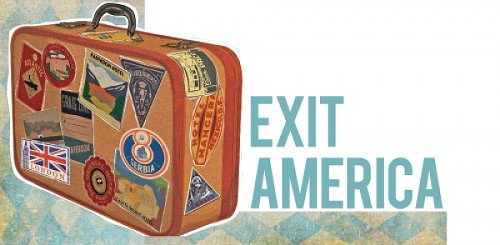It was 2006, and I had come “home.” To Greece.
No, I was not born there. I was a 36-year-old Salt Laker born and, for the most part, raised in Utah. Aside from dozens of vacations to our summer home in Greece, I had lived my whole life in America as an American, and was proud of it.
Yet, here I was, living and working in Greece, applying for my Greek national identification card at the police station and registering for basic training in the Greek Army. Aside from a slight American accent, a few grammatical errors and the open expression on my face common to Americans, I was every bit a Greek. Or was I?
Like many of my fellow Americans, I am a “hyphenated American.” Greek-Americans in particular tend to have a very strong attachment to their ancestry, even into the third and fourth generation, and despite a high intermarriage rate. Throughout America, it is not uncommon to find Greek-Americans a few generations removed passionately speaking of Greece as “the homeland,” something rather uncommon in other European Americans. Notwithstanding the stereotypes in My Big Fat Greek Wedding, Greek-Americans really do have a special attraction to their European homeland.
I guess my hyphenated status was more active than others, going beyond a sense of heritage to a sense of dual identity, which eventually merged into dual nationality. In my case, this dualism (and duel-ism) emerged not so much from the Greek Orthodox community and cultural organizations but rather from constant summers in Greece, on my father’s native island, Hydra, while growing up. I realized that there was a great difference between Greeks in America and those in Greece, and I wanted to experience life in Greece as a local, rather than as a visitor. As I think about it, maybe there is a local, Utah angle to this yearning for Greece. Growing up in Salt Lake City, the Land of Zion for the LDS faithful, perhaps I sought “my own private Zion” in Greece.
Even choosing to attend the internationally oriented Georgetown School of Foreign Service for university seemed to confirm my desire to live abroad. My specialty was Eastern Europe, particularly the Balkan countries such as Serbia and Bulgaria that share Greece’s Byzantine Orthodox heritage. My interest in Greece became an interest in all things international. I studied in Hungary, Germany, Bulgaria and Chile. I learned different languages in addition to Greek and English. In my mid-20s, I decided to become a Greek citizen.
Going Dual
My journey to dual nationality was the result of ethnic affiliation first and foremost, but there are other motivations for “globalizing.” Apparently, after the recent presidential election, Google searches for “expatriation” and “dual citizenship” shot through the roof. While much of this is knee-jerk reaction, it does underscore a growing phenomenon: In a globalized world, people are globalizing themselves. Dual citizenship, as defined in our U.S. passports (see “Important Information, Item 14” in your U.S. passport) is “a person who has citizenship of more than one country at the same time.”
As a nation of immigrants—many of us just one or two generations removed from our ethnic identities—the United States is probably the greatest potential pool of dual citizens on Earth. Like many countries, for a long time the United States frowned on dual citizenship and still generally does, but dual citizenship in itself is not (usually) an act that will get your U.S. nationality revoked.
Claims to dual citizenship can be made in many ways—most often, such as in my case, via ancestry but also, notably, in the case of Israel, being a member of the Jewish faith. Each nation of origin will have its own laws, and more practically, its own bureaucracy in processing individuals claiming their nationality based on ancestry.
Ireland offers nationality to anyone with a grandparent born in Ireland. According to U.S. Census Bureau reports, 35 million Americans claim Irish ancestry. Since Ireland joined the E.U., and particularly during its boom economic years, tens of thousands of Irish-Americans assumed Irish nationality, which, in addition to the right to work in Ireland, opened up the entire European Union to their settlement and labor. Three summers ago in Greece, on my father’s native island, I met an Irish-American couple happily working and residing in Greece, based on the E.U. labor and settlement laws.
Most European countries have similar citizenship regimes to Ireland, though new E.U. member Hungary offers citizenship to anyone whose ancestors were citizens of the former Austro-Hungarian Empire. This opens the door to citizenship for tens of millions of potential “Hungarians,” even though Hungary itself has a population of 11 million! Hungarian nationals, as E.U. member-state citizens, can work in any of the E.U.’s 27 member countries, and Hungarians travel visa-free to the United States. Mexico long resisted dual citizenship, but with so many potential “Mexicans” in the United States, they sensibly altered this restriction and now many tens of thousands, if not more, Mexican-Americans hold Mexican nationality. People of Latin American background also traditionally had a claim to Spanish residence and citizenship.
No discussion of dual citizenship for Americans should omit our northern neighbor, Canada. Canada is a prime destination for immigrants from all over the world, including a fair number of U.S. nationals. Canada actively but selectively encourages immigration, particularly focusing on those with education and skills needed in Canada, and a facility for English and French, the two national languages. There is a point system for determining one’s eligibility for residence, which then can turn into citizenship after a period of three years’ residence. Canada seeks to draw immigrants who will actively contribute to their economy and society, rather than base immigration on familial links. Australia and New Zealand, which also actively seek immigrants, have immigration regimes rather similar to Canada, and Americans are linguistically and culturally well poised to gain immigrant status to these countries.
Married to the Globe
Marriage may often become grounds for citizenship. However, just because your spouse is, say, Dutch, does not mean that you will automatically have citizenship. Usually, some sort of residence
period is also required. My wife received an automatic residence permit in Greece as the spouse of a Greek citizen, but residence of three years’ duration and having a Greek spouse is also required for citizenship. We lived in Greece for two years.
Currently, we live in Serbia, where my Serbian-American wife is a citizen. I could have citizenship here after five years’ residence as a spouse of a Serbian citizen.
Do note that these rules are subject to change and can become pretty bizarre after a while. For instance, based on Hungary’s inclusive citizenship law, my wife can apply for Hungarian citizenship, as well as my children, because my wife’s Serbian hometown, Sombor, was once part of Austria-Hungary. I could then apply for citizenship based on my wife’s would-be nationality and my limited ability to speak Hungarian. No less an authority than the Hungarian ambassador to Serbia told us this, at a party in the Greek Embassy in Belgrade, Serbia.
My wife’s father was born in Croatia, therefore my wife is eligible for Croatian nationality. So, aside from her current U.S. and Serbian citizenship, she could potentially become Hungarian, Croatian and Greek via marriage. Our children have three citizenships: U.S., Greek and Serbian.
Golden Years
Aside from marriage and ancestry either direct or a bit removed, there are other ways to self-globalize. Some countries, interested in luring well-heeled retirees or investors, have residence and citizenship schemes for their countries. For many years, I subscribed to International Living magazine, which has a wealth of practical information about the mechanics of moving abroad and obtaining a second citizenship.
“Retirement expatriation” may become more and more popular as the cost of medical care increases, and Social Security and retirement income may be unable to maintain a U.S. standard of living. In Serbia, I have met dozens of Serbian-American retirees who have repatriated to Serbia due to the lower cost of living. In large part, cost-of-living considerations brought my family and I to Serbia as well.
Many of the countries International Living magazine recommends are in Central and South America, and the lower cost of real estate, consumer goods and health services are a big draw. Here, a bit of caveat is in order: Yes, the cost of living is cheaper in, for example, Nicaragua and Ecuador, but political and economic instability may be a problem. Constant personal contact with the U.S. embassy in the country in question is important. This is yet another benefit of being American; your embassy generally looks after you and will usually have a fair amount of clout abroad.
Would-be health system or “benefit expatriates” should determine if they are automatically eligible to assume health or other benefits in “their” new country. Hungary, for example, does not mind having more Hungarian passport holders, but the debt-laden and relatively poor country hardly wants a flood of new Hungarians stretching the country’s finances to a breaking point.
In Serbia, resident minors have guaranteed health care as part of the government budget, but my wife needed a job to get insurance for herself and me, though if she lost her job, she (but not I) would still have state health care. Each country will have different rules, and something as important as health care needs to be investigated carefully by any aspiring expatriate. Assume nothing.
The Fine Print
At age 27, I received Greek citizenship based on my father’s birth certificate and passport. This one-liner should not obscure the bureaucratic nightmare that ensued before I became registered, via the Greek Embassy in Washington, to my father’s municipality, and that after eight months, my passport arrived, with my name ever so slightly misspelled (one L in Billinis rather than two). Everyone, and I mean everyone, said, “Just leave it alone!” To correct this error would be a bureaucratic nightmare. Just because a process exists does not mean that it is not fraught with red tape or cultural barriers that an American may not be able to understand.
When I moved to Greece, in spite of my fluency in the language and my deep understanding of the culture, I found that nothing prepared me for what Greek residents euphemistically call the “Greek Reality.” What is on paper is rarely what is, and the would-be American dual national needs to know this. Reality, as I found on numerous occasions, often bites.
For example, documents you may receive at a consulate may not be accepted in your new country. I found that out the hard way when documents I needed for my military service from the Greek Consulate in Chicago were not accepted at my military base; my wife had to go to the consulate and call me on my cell phone on the parade ground at my military base to straighten that one out. Another law allowed me to import a car and all household effects tax free, but the paperwork was inches high and cost plenty in stamp duties, official photocopies and notarizations—to say nothing of nerves. The list continues and no doubt other countries have hidden realities, which make the dream of living abroad less attractive in the full light of day.
If you plan to combine your dual nationality with residence, language capability is a real must. High school French does not make a French speaker, nor does growing up bilingual in Greek, as I found. In Britain, where we lived for a few years, I found the saying “Americans and Britons are divided by a common language” rang true. And even in Canada, the differences can be subtle yet sharp.
In terms of language, Utahns who served LDS missions may have an advantage. Missionary language training is followed by an extremely practical immersion experience: missionary work. This hands-on language training is far more useful than school or literary experience with a language.
While we are on the subject of Utah, the vast genealogical database here is also an advantage for the Utah global citizen. You can research your ancestors and then study each country’s citizenship law and naturalization process.
Once you find out what your potential nationality is, in this day and age, the Internet should be your first destination. Find the embassy or consulate of your would-be country and inquire further about the process.
As a general rule, be prepared for delays. Not all countries are as bureaucratically ... difficult as Greece, but I was only one generation removed from Greece, with plenty of relatives there to help—and they did, standing in line, going from one ministry to the other, etc.
To provide a personal example, when my daughter was born in London, I took her British birth certificate to the Greek embassy to begin the process of obtaining Greek nationality and a passport. After about one month, the embassy informed me that a Greek birth certificate had been produced by the municipality of Hydra, my Greek “hometown,” and my wife and I were given an appointment to come with my daughter and the passport photos to begin the process.
Long story short, the passport was rejected because the birth certificate issued by Hydra did not conform to the Greek Interior Ministry guidelines. The municipality sent another birth certificate, we set up another appointment, and this birth certificate was also nonconforming. Disgusted, I gave up, and though my daughter is a Greek citizen, she does not have a Greek passport.
The other thing, in many countries, Greece included, few documents are digitized, and often enough, key documents, such as birth certificates, need to be requested in the original and in person. This requires either the help of relatives with a local power of attorney or an extended vacation in your would-be country.
The road to a second nationality is a drawn-out process, and an expensive one. I already touched on my experience in repatriating our personal effects, but at least I knew how to communicate in Greek and was in-country. Doing this abroad would be virtually impossible and will cost a fortune in notarizations, couriers, consular fees, etc. You probably need an extended period in your future country to get things done. Unless someone is paying your way or putting you up, this does not come cheap.
However, the way I look at it, if you are interested in becoming, say, German, you ought to visit the country anyway to get a feel for the place and how it works before becoming a citizen. Becoming a dual citizen ends up being a financial, time-consuming and, hopefully, emotional investment.
What They Don’t Tell You
The emotional tug that encouraged me to assume Greek nationality also induced me to take a job in Greece, though I knew that by so doing, I became liable for military service. I served, with a shortened term, despite being a senior banking executive 36 years of age and married with a child. Here, I refer the reader again to the back of his/her U.S. passport: “A dual citizen may be subject to the laws of the other country that considers that person its citizen while in that country’s jurisdiction, including conscription for military service.”
Personally, I enjoyed my almost-tourist version of military service, and I identified with being Greek. The point is, if you take a nationality, think of it not just in terms of the benefits, but in terms of doubling your potential legal, tax and military responsibilities. You really ought to think about, and to care about, what you are doing. You may end up in a uniform.
After working two years in Greece, and, frankly, tired of the “Greek Reality,” I received an offer to work in London, where E.U. reciprocity gave me national treatment for employment and benefits. London was knee-deep with Americans, Canadians and Australians, all flashing various European passports, availing themselves to employment opportunities in pre-crisis London and often having only the flimsiest connection to their titular nationality. The mid-2000s were boom years in Europe, particularly in finance, and many Americans dug up their ancestral roots to enter the old continent on a level playing field. Many of us are now making our way back to the United States. Given that Europe is in the throes of what I would call an extended and structural recession, the lure of Europe as a job market for American E.U. passport-holders is certainly not what it used to be. That said, if you are applying for jobs, or even want to work for a summer in, say, Spain or Greece as an English teacher or a waiter in a restaurant, an E.U. country passport is a plus.
Taxing Matters
I also met another type of American expatriate,
particularly in London: high rollers who sported American accents but discreetly reminded everyone that they were no longer American. These were the tax expatriates, super-high earners who renounced U.S. nationality in large part to avoid the global reach of U.S. tax law. Facebook’s co-founder, a Brazilian-born U.S. citizen now residing in Singapore, recently denationalized himself in this manner. No doubt, just as legal persons (corporations) often decamp to more favorable tax locations, more and more natural persons will seek to expatriate themselves in the same manner.
As much as I think of myself as a practical individual, I am emotional to the extent that I believe that to take on a nationality, you should identify with and love the country in question. I love both the United States and Greece, and I would never renounce either nationality, regardless of some potential tax benefits.
U.S. citizens must file income tax, no matter where they live. Having said that, the vast majority of your foreign income is exempted, unless you are a super high earner. As an American abroad, it’s important that you file your taxes and keep the IRS apprised of your income. Many Americans living and working abroad forget to do this, and it’s a potentially costly mistake.
Certain actions can cause you to lose your U.S. nationality, such as taking up arms against the United States, formally renouncing your U.S. nationality or, surprisingly, entering the U.S. on a foreign passport. This is a lesser-known detail passed on to me when I lived in London. We were registering our London-born daughter as a U.S. citizen, and the consular official warned us not to travel with her to America before she got a U.S. passport, “as she could forfeit her nationality.” When I took up Greek nationality, I consulted an immigration attorney with a specialty in dual nationality. The reader should do the same: Always seek legal advice when making such key decisions.
The Grass Is Greener
Dual citizenship has an increasing and, in my opinion, positive role to play in international commerce and relationships. Having multiple national identities is something all too common in our land of immigrants, and, if anything, dual nationality may help bridge nations rather than divide them. What often happens with Americans who move abroad to countries from which their ancestors left, they find out more about themselves and, perhaps, why their parents or grandparents pursued a new future elsewhere.
For me, it was only when I returned to Greece and lived as a Greek, raising a family there, that I truly realized why my parents and grandparents were determined to be American. Everyday life is a challenge in Greece, filled with petty bureaucracies and corruption, which, in my view, effectively negates the beauty and charm of the place. My dream of Greece is one that, when it came true, fell short. But having seen it with my own eyes and, as my wife says, “on my own skin,” allowed me to appreciate the efficiency and transparency of America. We’re experiencing a similar mixture of challenges in Serbia, where we’ve lived and worked since 2010. My Serbian-American wife is reminded daily of why she decided more than 15 years ago to move to America.
After seven years in three European countries, two of which are our “own,” we are now planning to return to America (either Chicago or Salt Lake City) with a fresh appreciation for being American. Without our multiple national identities and experience living abroad, we probably would not appreciate what we have.
It is one thing to hear that “the grass isn’t always greener”—some of us just had to see it for ourselves. Everybody should have the opportunity to see the grass on the other side if they wish to, and dual nationality provides that vision. Though fraught with challenges, I am a glad to be both American and Greek, with real, “on the ground” experiences and memories in both countries.
Alexander Billinis is a Salt Lake native. A banker by trade and an author, he currently lives in Serbia. His book, The Eagle Has Two Faces, is available now.
More by Alexander Billinis
-
Beyond Budapest: Spas and Wine in Siklos, Hungary
- Mar 12, 2013
-
Trieste: Coffee time in a different Italy
- Feb 16, 2013
-
Rome 4x4: four people, four days in the Eternal City
- Feb 9, 2013
- More »
Latest in Cover Story
Readers also liked…
-
Forget the family pedigree—Robert F. Kennedy Jr should not be the next president of the United States
Trojan Horse
- Jun 21, 2023
-
Women decry harassment and toxic culture at St. George auto dealership
Men at Work
- Oct 11, 2023









